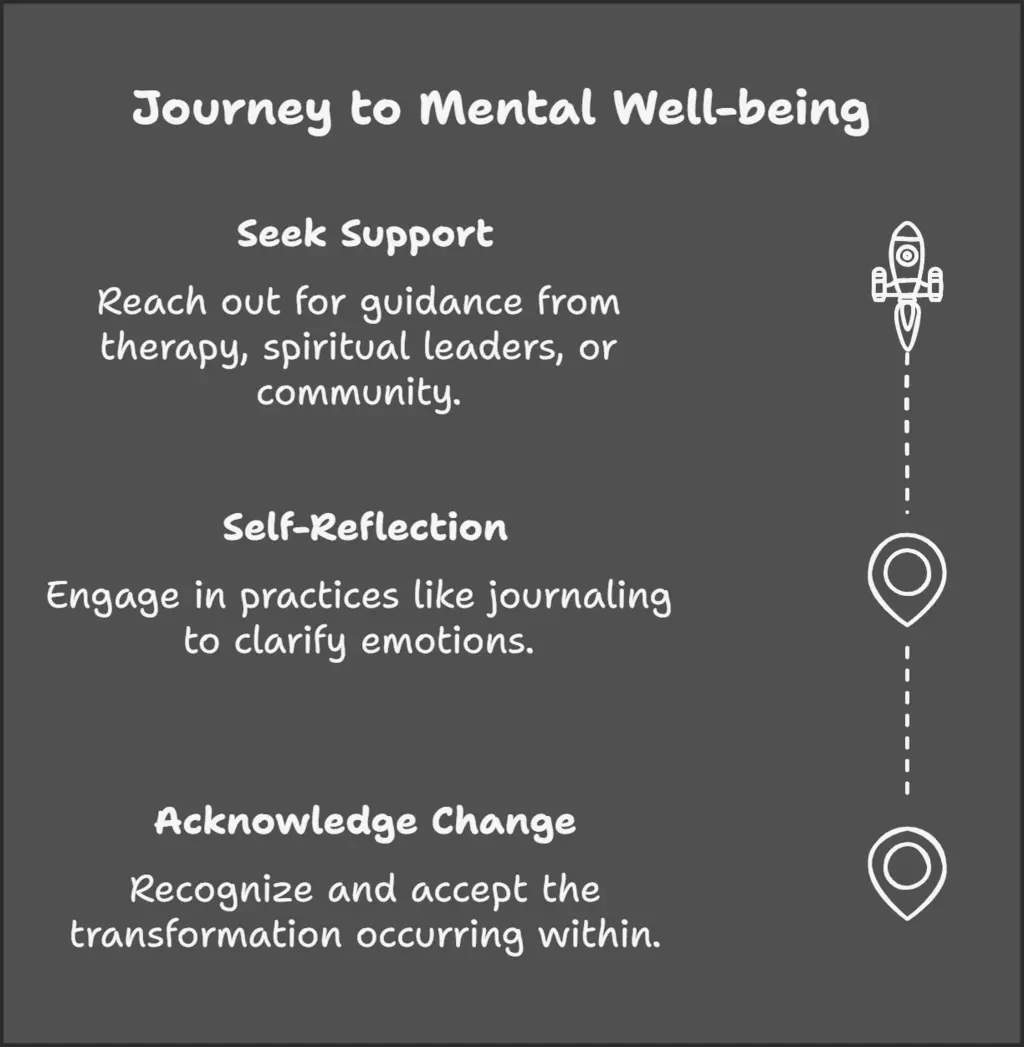Spiritual Intervention – How They Can Improve Mental Health

Have you ever felt like life was pushing you toward something deeper? A series of events might have forced you to question everything, or a tough period might have left you searching for meaning.
If so, you might have experienced a spiritual intervention. These represent key turning points that urge you to pause, reflect, and shift your path.
These moments can be subtle or powerful, arising from hardship, chance meetings, or quiet realizations. Spiritual interventions, in any form, provide opportunities for change, self-awareness, and healing.
Spiritual Intervention Meaning?
Spiritual intervention is when something, whether life itself, an inner voice, or even a divine presence, steps in to wake you up. Sometimes, it happens when you’re stuck in unhealthy patterns.
Other times, it arrives when you’re on the edge of personal growth but don’t know how to take the next step.
Have you ever had a moment when a song, a conversation, or a book seemed to speak directly to you? These small but powerful nudges are common ways that spiritual interventions unfold.
They encourage change, healing, and self-discovery, leading to a more authentic life.

How Spiritual Intervention Affects Mental Health
Spiritual interventions can be both challenging and healing. They often bring clarity, but they can also stir up emotions. While they may initially feel overwhelming, they offer a path to relief and renewal.
Engaging in meditation, prayer, or spiritual counseling can provide valuable support in understanding and navigating these experiences.
Studies published in the Journal of Psychology and Theology show that spiritual practices support emotional stability and resilience. They provide a sense of meaning, reduce stress, and help people move through pain with a sense of purpose.
How to Navigate Spiritual Interventions for Mental Well-being:
If you’ve ever felt lost in the process, remember, you’re not alone. Many people have traveled this path before you. There are many helpful resources to guide and support you.
Signs of Spiritual Intervention
Not all wake-up calls are loud and obvious. Some come as whispers. Here are a few signs that you may be experiencing a spiritual intervention:
Although these experiences may feel unsettling, they often signal that change is needed. Have you noticed any of these in your own life?
Subscribe to Create Higher Vibrations!
Get Inspiration and Practical advice straight to your inbox.
Free Will vs. Destiny: Choosing Your Path
Sometimes it feels like forces beyond us are calling the shots, but free will still gets a say. We’re all equipped with choice, and with choice comes responsibility, that slightly annoying fact. But it’s also empowering.
At the end of the day you‘re choosing which road to walk down—you‘re just getting a nudge toward, let‘s say, “your best life.”
Balancing free will and destiny can be tricky. It’s easy to think our lives are just random events. However, spiritual interventions reveal a deeper meaning behind everything.
Even when life is out of our control, we can take proactive steps to align us with our purpose. The magic is finding that sweet spot between surrendering to the flow and taking deliberate action.

Spiritual Interventions in Nursing and Healthcare
Spiritual care plays a vital role in healing. Nurses and healthcare providers often witness moments where patients need spiritual support as much as physical treatment.
For example, a nurse may:
Beyond traditional healthcare, holistic practitioners also incorporate spiritual interventions.
Practices like Reiki, guided meditation, and energy work help patients process trauma, grief, and anxiety. Integrating spirituality into healthcare provides a comprehensive approach to well-being.
The Role of Spiritual Guides and Mentors
Sometimes, spiritual interventions come in the form of people. A mentor, a teacher, or even a stranger might say something that shifts your entire mindset.
Different guides serve different roles:
Choosing the right guide depends on your journey. Some people find wisdom from multiple sources over time. Have you ever had someone unexpectedly change your outlook on life?

The “Dark Night of the Soul”
Have you ever gone through a period where everything seemed to fall apart? That’s what some call the “dark night of the soul.” It’s a deep spiritual crisis where old beliefs no longer serve you, and life feels uncertain.
During this time, you may:
Though difficult, this phase leads to profound personal transformation. Seeking support from trusted friends, therapists, or spiritual mentors can help you navigate it with deeper understanding and insight.
East vs. West: Spiritual Styles
Eastern and Western spirituality might seem worlds apart, but they point toward the same truths. Eastern spirituality emphasizes karma, rebirth, and seeing through illusions.
Meanwhile, Western spirituality often focuses on community and religious rituals like prayer and worship. Underneath it all, both traditions want you to connect to something bigger, dissolve the ego, and find real peace.
The beauty of exploring both Eastern and Western spiritual approaches is that you don’t have to choose one over the other. You can take what resonates from each and create a practice that works for you.
Maybe you like the mindfulness practices of the East but also find comfort in the communal aspects of Western rituals. Spirituality isn’t a one-size-fits-all thing, it’s about finding what speaks to your soul.
Tools for Grounding and Stability
Spiritual interventions can be powerful, but they should be balanced with grounding practices. Here are a few ways to stay centered:
Grounding ensures that your spiritual journey remains meaningful and stable. What grounding practices work best for you?
Avoiding Pitfalls in Spiritual Growth
Spirituality is transformative, but it’s important to stay balanced. Some people become disconnected from reality, seeking only mystical experiences. Others may neglect their emotional and mental health, assuming spirituality alone will solve everything.
A well-rounded approach ensures spiritual growth remains beneficial rather than overwhelming. Stay engaged in daily life, apply insights in practical ways, and seek support when needed.
Integrating Spiritual Insights into Daily Life
Spiritual interventions aren’t just rare, dramatic moments. They can shape how you live each day. Try these steps to integrate spirituality into your daily routine:
Small, intentional changes can help integrate spirituality into your daily life, fostering a deeper sense of fulfillment and balance.
Final Takeaway
Spiritual interventions are an invitation to grow, heal, and connect with a deeper sense of self. “Personal experiences, important life events, or advice from a mentor show us that change is possible.”
If you’re experiencing a shift, embrace it. Take small steps toward self-discovery through meditation, counseling, or simply reflecting on life’s lessons. You are not alone in seeking meaning and purpose. The answers you seek may already be within you.
For deeper insights and personalized guidance on your spiritual journey, consider working with Coach Vishnu Ra.
His expertise can help you navigate this transformative process with clarity and confidence. Reach out today and take the next step toward a more aligned and empowered life.


